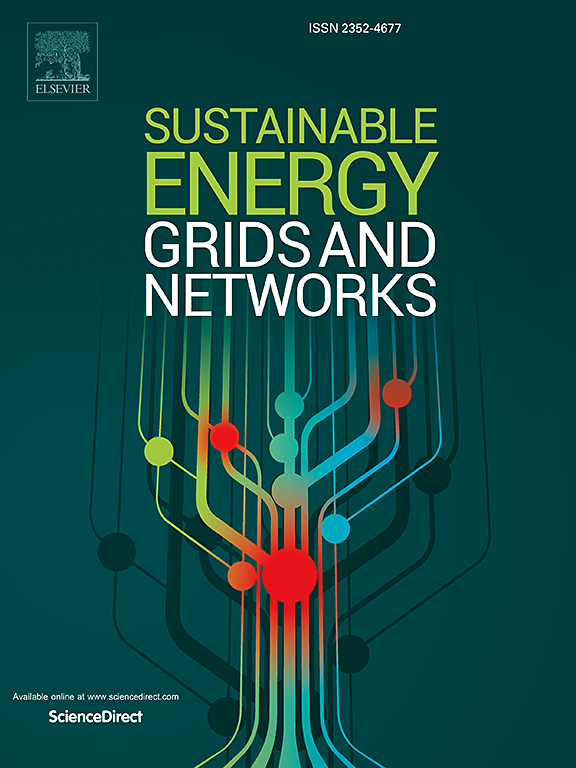提高现代TSO-DSO协调机制灵活性提供的效率
IF 4.8
2区 工程技术
Q2 ENERGY & FUELS
引用次数: 0
摘要
输电系统运营商(TSO)和配电系统运营商(DSO)之间的柔性协调涉及到DSO通过求解优化方案来追踪其柔性潜力的极限。优化目标还包括在DSO映射无功灵活性潜力或最小化灵活性成本时,对偏离商定的有功功率轮廓的惩罚。本文对DSO在多周期环境下的优化问题进行了改进。本文提出了一种修正的灵活性数学表达式,并提出了要求特定的灵活性模式以强调在特定时期提供灵活性的可能性。建议的增强在不影响计算时间的情况下,大大提高了灵活性的潜力。对惩罚格式进行了改进,将现有的混合整数二次规划形式改为混合整数线性规划,从而大大缩短了求解时间。在34母线配电网试验系统上对提出的跨24个耦合时段的柔性协调公式进行了5种柔性模式的试验。本文在前人工作的基础上,提出了一种顺序线性规划算法,将非线性最优潮流问题线性化,从而求解了随机多周期最优潮流问题。本文章由计算机程序翻译,如有差异,请以英文原文为准。
Boosting the efficiency of flexibility provision in modern TSO-DSO coordination mechanisms
Flexibility coordination between the transmission system operator (TSO) and the distribution system operator (DSO) involves the DSO solving an optimization program to trace the limits of its flexibility potential. The optimization objective also involves a penalty on deviation from an agreed active-power profile when the DSO is mapping the reactive power flexibility potential or minimizing flexibility cost. This paper proposes a number of improvements on the optimization problem carried out by the DSO in a multi-period setting. The paper presents a revised mathematical expression of flexibility, and the possibility to request particular flexibility patterns to emphasize flexibility provision for certain time periods. The proposed enhancements bring along a sizable increase in the flexibility potential, without impact on the computation time. The penalty scheme is also modified, and the existing mixed integer quadratic program formulation is replaced by a mixed integer linear program, thus, bringing forward a significant reduction in solution time. The proposed flexibility coordination formulation across 24 coupled periods is tested on the 34-bus distribution test system for five flexibility patterns. This paper is built upon previous work by the authors, which developed a sequential linear program algorithm, linearized the non-linear optimal power flow problem, and consequently, solved a stochastic multi-period optimal power flow problem.
求助全文
通过发布文献求助,成功后即可免费获取论文全文。
去求助
来源期刊

Sustainable Energy Grids & Networks
Energy-Energy Engineering and Power Technology
CiteScore
7.90
自引率
13.00%
发文量
206
审稿时长
49 days
期刊介绍:
Sustainable Energy, Grids and Networks (SEGAN)is an international peer-reviewed publication for theoretical and applied research dealing with energy, information grids and power networks, including smart grids from super to micro grid scales. SEGAN welcomes papers describing fundamental advances in mathematical, statistical or computational methods with application to power and energy systems, as well as papers on applications, computation and modeling in the areas of electrical and energy systems with coupled information and communication technologies.
 求助内容:
求助内容: 应助结果提醒方式:
应助结果提醒方式:


